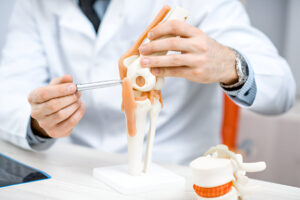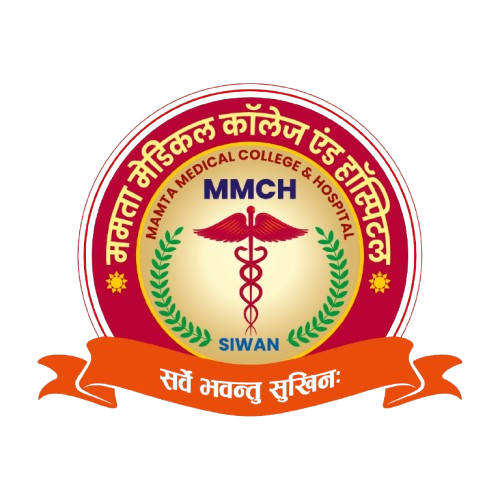
🦴 Department of Orthopedics
Mamta Medical College & Hospital, Siwan (MMCH)
The Department of Orthopedics at Mamta Medical College & Hospital (MMCH), Siwan, is dedicated to the diagnosis, treatment, rehabilitation, and prevention of disorders related to bones, joints, ligaments, muscles, and the spine. With a patient-centric approach, skilled faculty, and state-of-the-art facilities, our department serves as a regional center for orthopedic care, education, and research.
Our vision is to restore mobility and improve quality of life through evidence-based orthopedic practices while shaping the future generation of doctors through quality medical education.
🌟 Vision & Mission
Vision:
To be a center of excellence in orthopedic surgery, education, and musculoskeletal research.
Mission:
To provide affordable, advanced, and ethical orthopedic care
To train MBBS students in fundamentals of musculoskeletal medicine and trauma care
To promote research in bone diseases, trauma, and joint disorders
To offer specialized rehabilitation and follow-up care
🏥 Clinical Services
The Orthopedics department at MMCH offers a wide range of services, including trauma care, joint replacement, pediatric orthopedics, spine surgeries, and more. Our goal is early diagnosis, effective treatment, and optimal rehabilitation.
🔹 OPD Services:
Daily orthopedic consultations and evaluation
Follow-up care for trauma and fracture patients
Management of joint pain, arthritis, and back pain
Pediatric orthopedic assessment
Diagnosis of congenital and acquired musculoskeletal deformities
🔹 Emergency Services:
Available 24/7 for:
Road traffic accidents and trauma injuries
Compound/open fractures
Hip and shoulder dislocations
Spinal cord injuries
Acute compartment syndrome
Crush injuries
Polytrauma management in coordination with General Surgery & Anesthesia
🔹 Surgical Services:
We provide surgical intervention for a variety of orthopedic conditions:
1. Trauma & Fracture Management
Internal fixation with plates, nails, screws
External fixators for complex and open fractures
Minimally invasive fracture surgeries
Interlocking nailing for long bone fractures
Pelvic and acetabular surgeries
2. Joint Surgeries
Arthroscopy of knee and shoulder
ACL reconstruction
Meniscal repair
Total and partial joint replacements (Knee/Hip)
3. Pediatric Orthopedics
Clubfoot management
Developmental dysplasia of the hip (DDH)
Limb deformity correction
Cerebral palsy-related surgeries
4. Spine & Neuro-Ortho Care
Disc prolapse surgeries
Vertebral fixation
Spinal deformity corrections (scoliosis, kyphosis)
Spondylolisthesis stabilization
5. Deformity Corrections & Reconstructive Orthopedics
Congenital and post-traumatic deformity correction
Limb lengthening procedures
Ilizarov technique
Osteotomies and tendon transfers
🔧 Infrastructure & Facilities
The department is equipped with modern infrastructure to ensure quality surgical and rehabilitation care.
Dedicated Orthopedic Wards for male and female patients
Pre- and post-operative patient monitoring units
Modular Operation Theatres with orthopedic tables
C-Arm and image intensifier for precision surgeries
Physiotherapy and rehabilitation center
Plaster room and minor OT within OPD
Well-equipped Emergency Room for trauma stabilization
🧬 Diagnostic & Imaging Support
Collaboration with Radiology and Pathology departments enables accurate diagnosis:
Digital X-Ray and Portable X-Ray Units
MRI and CT Scan facilities (for spinal and joint imaging)
Bone mineral density (BMD) scans
Routine blood tests and special bone markers
Fine Needle Aspiration Cytology (FNAC) and biopsy for bone tumors
🎓 Academic Activities
The Department of Orthopedics is deeply involved in teaching undergraduate MBBS students under the Competency-Based Medical Education (CBME) curriculum prescribed by the National Medical Commission (NMC).
UG Training Includes:
Didactic lectures and interactive seminars
Ward postings and bedside teaching
Case discussions and presentations
Orthopedic OT observation and assistance
Skills training: splinting, casting, traction, suturing
Learning orthopedic instrument usage
Assessment through internal exams, OSCE, logbooks
🧪 Research & Innovation
Research is an integral part of the orthopedic department. Key areas of research include:
Trauma outcome studies
Osteoporosis in rural populations
Incidence and management of pediatric orthopedic deformities
Surgical outcome analysis (e.g., fracture healing timelines)
Use of indigenous implants in low-resource settings
Infection control in orthopedic surgeries
Regular participation in national orthopedic forums, conferences, and journals is encouraged.
🩺 Community Outreach
Recognizing our responsibility toward society, we conduct regular orthopedic health camps in rural and tribal areas of Bihar.
Community Activities:
Free orthopedic screening and treatment advice
Fracture care and cast application in field conditions
Clubfoot awareness and early detection programs
Awareness on road safety and bone health
Collaboration with Primary Health Centers (PHCs) and NGOs
🔑 Key Highlights
✅ 24×7 orthopedic trauma care
✅ Modern surgical techniques and implants
✅ UG teaching as per NMC norms
✅ Patient rehabilitation and physiotherapy
✅ Pediatric and geriatric orthopedic services
✅ Research and evidence-based practice
✅ Holistic musculoskeletal health management
📢 Public Awareness Message
“Strong bones support a strong life. Early diagnosis and timely treatment of bone injuries can prevent lifelong disability. Avoid self-medication and consult qualified orthopedic specialists.”
